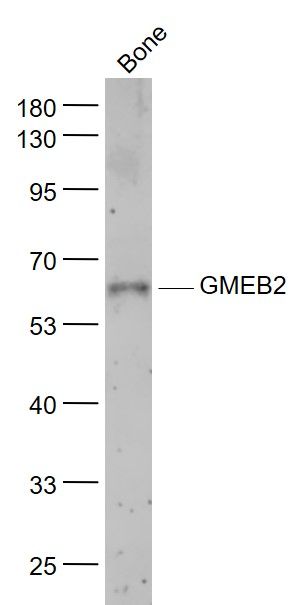GMEB2 Polyclonal Antibody
Purified Rabbit Polyclonal Antibody (Pab)
- SPECIFICATION
- CITATIONS
- PROTOCOLS
- BACKGROUND

Application
| WB, IHC-P, IHC-F, IF, ICC, E |
|---|---|
| Primary Accession | Q9UKD1 |
| Reactivity | Rat, Dog, Bovine |
| Host | Rabbit |
| Clonality | Polyclonal |
| Calculated MW | 56 KDa |
| Physical State | Liquid |
| Immunogen | KLH conjugated synthetic peptide derived from human GMEB2 |
| Epitope Specificity | 101-200/530 |
| Isotype | IgG |
| Purity | affinity purified by Protein A |
| Buffer | 0.01M TBS (pH7.4) with 1% BSA, 0.02% Proclin300 and 50% Glycerol. |
| SUBCELLULAR LOCATION | Nucleus. Cytoplasm. May be also cytoplasmic. |
| SIMILARITY | Contains 1 SAND domain. |
| SUBUNIT | Homodimer, and heterodimer of GMEB1 and GMEB2. GMEB1 and GMEB2 form the parvovirus initiator complex (PIF). Interacts with the glucocorticoid receptor (NR3C1). May interact with CREB-binding protein (CBP). |
| Important Note | This product as supplied is intended for research use only, not for use in human, therapeutic or diagnostic applications. |
| Background Descriptions | GMEB-2 is a DNA-binding protein that plays a crucial role modulating transcription upon activation by steroid hormones. GMEB-2 is ubiquitously expressed with preferential expression in developmentally important tissues, such as testis, bone marrow, placenta and fetal tissues. It localizes to the nucleus and cytoplasm and contains a SAND domain near its N-terminus and a C-terminal coiled coil structure. GMEB-2 functions as a homodimer or as a heterodimer with GMEB-1. The formed complex specifically binds to glucocorticoid modulatory elements (GME) in the promoter region of target genes and recruits the histone acetylase CREB binding protein (CBP) during glucocorticoid signaling. This acts to increase sensitivity to low concentrations of glucocorticoids. In addition, GMEB-2 functions as an auxiliary factor required for parvovirus replication. |
| Gene ID | 26205 |
|---|---|
| Other Names | Glucocorticoid modulatory element-binding protein 2, GMEB-2, DNA-binding protein p79PIF, Parvovirus initiation factor p79, PIF p79, GMEB2, KIAA1269 |
| Target/Specificity | Expressed in peripheral blood lymphocytes and fetal liver. Expressed preferentially in reproductive and/or developmentally important cells, such as testis, placenta, bone marrow and fetal tissues. |
| Dilution | WB=1:500-2000,IHC-P=1:100-500,IHC-F=1:100-500,ICC=1:100-500,IF=1:100-500,ELISA=1:5000-10000 |
| Storage | Store at -20 ℃ for one year. Avoid repeated freeze/thaw cycles. When reconstituted in sterile pH 7.4 0.01M PBS or diluent of antibody the antibody is stable for at least two weeks at 2-4 ℃. |
| Name | GMEB2 |
|---|---|
| Synonyms | KIAA1269 |
| Function | Trans-acting factor that binds to glucocorticoid modulatory elements (GME) present in the TAT (tyrosine aminotransferase) promoter and increases sensitivity to low concentrations of glucocorticoids. Also binds to the transferrin receptor promoter. Essential auxiliary factor for the replication of parvoviruses. |
| Cellular Location | Nucleus. Cytoplasm. Note=May be also cytoplasmic. |
| Tissue Location | Expressed in peripheral blood lymphocytes and fetal liver. Expressed preferentially in reproductive and/or developmentally important cells, such as testis, placenta, bone marrow and fetal tissues |

Thousands of laboratories across the world have published research that depended on the performance of antibodies from Abcepta to advance their research. Check out links to articles that cite our products in major peer-reviewed journals, organized by research category.
info@abcepta.com, and receive a free "I Love Antibodies" mug.
Provided below are standard protocols that you may find useful for product applications.
If you have used an Abcepta product and would like to share how it has performed, please click on the "Submit Review" button and provide the requested information. Our staff will examine and post your review and contact you if needed.
If you have any additional inquiries please email technical services at tech@abcepta.com.













 Foundational characteristics of cancer include proliferation, angiogenesis, migration, evasion of apoptosis, and cellular immortality. Find key markers for these cellular processes and antibodies to detect them.
Foundational characteristics of cancer include proliferation, angiogenesis, migration, evasion of apoptosis, and cellular immortality. Find key markers for these cellular processes and antibodies to detect them. The SUMOplot™ Analysis Program predicts and scores sumoylation sites in your protein. SUMOylation is a post-translational modification involved in various cellular processes, such as nuclear-cytosolic transport, transcriptional regulation, apoptosis, protein stability, response to stress, and progression through the cell cycle.
The SUMOplot™ Analysis Program predicts and scores sumoylation sites in your protein. SUMOylation is a post-translational modification involved in various cellular processes, such as nuclear-cytosolic transport, transcriptional regulation, apoptosis, protein stability, response to stress, and progression through the cell cycle. The Autophagy Receptor Motif Plotter predicts and scores autophagy receptor binding sites in your protein. Identifying proteins connected to this pathway is critical to understanding the role of autophagy in physiological as well as pathological processes such as development, differentiation, neurodegenerative diseases, stress, infection, and cancer.
The Autophagy Receptor Motif Plotter predicts and scores autophagy receptor binding sites in your protein. Identifying proteins connected to this pathway is critical to understanding the role of autophagy in physiological as well as pathological processes such as development, differentiation, neurodegenerative diseases, stress, infection, and cancer.


